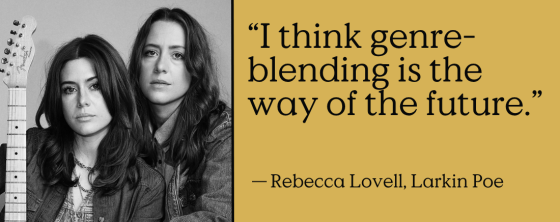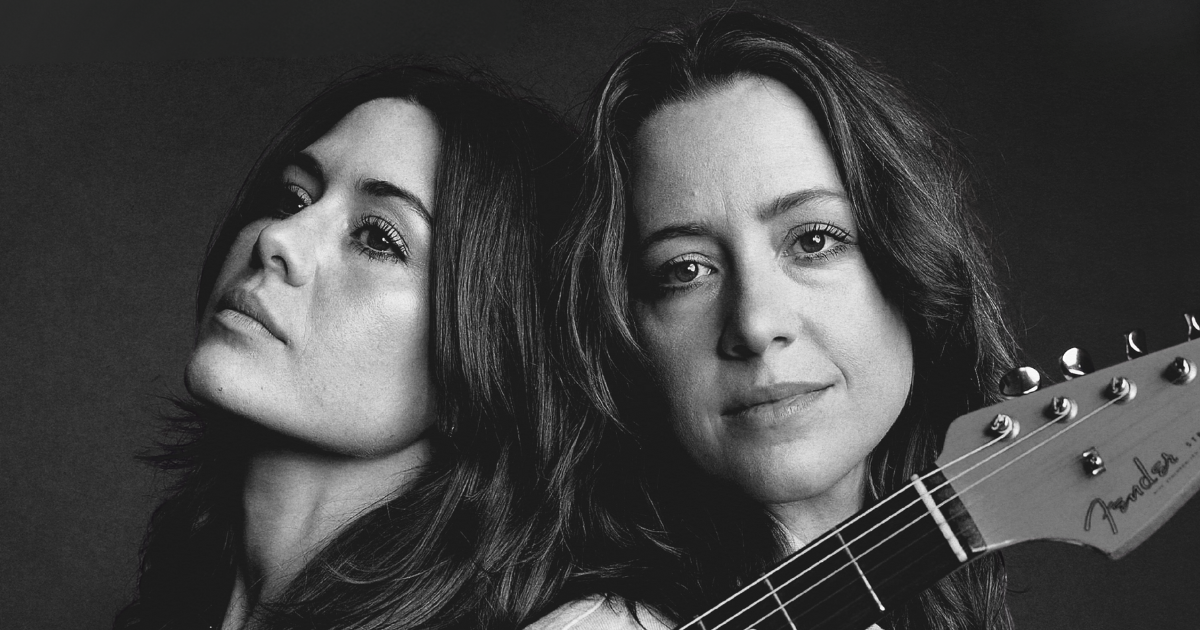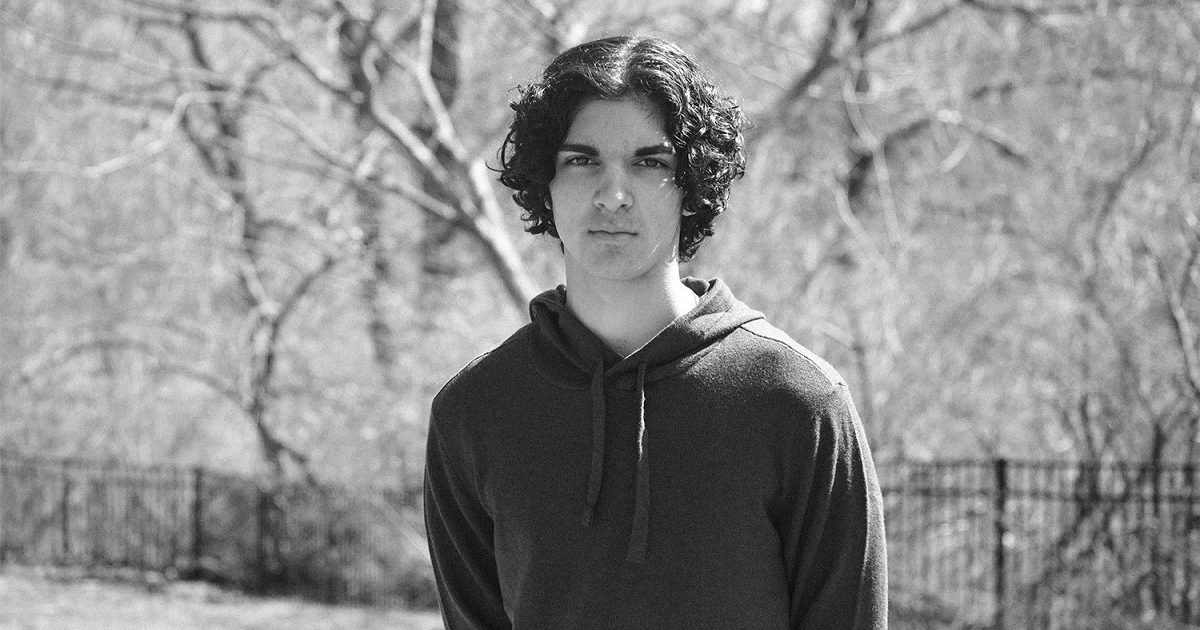Megan and Rebecca Lovell are Larkin Poe, a band that nestles into a myriad of genres – and the sisters are good with that. Their newest full-length album effort, Bloom, out January 24, comes fresh off the heels of a GRAMMY win for Best Contemporary Blues Album with last year’s Blood Harmony. They also landed Duo of the Year at 2024’s Americana Honors & Awards, proving that by digging into their own stories, collaborating even when it isn’t easy, and filtering it all through what the music will feel like on stage, they carve a sound that knocks down doors into multiple genre territories.
Independent spirit permeates everything the sisters do, from the way they write and produce the music to how they map out the aesthetics of how they present the work. Bloom is no exception, finding the women delving deeply into personal and social themes in a way they say they have not before, the result of getting real with each other and learning how to collaborate through the writing process.
In “You Are the River,” we find them contemplating a common theme throughout the album, that sometimes the best and the worst are married inextricably and tie us to each other.
The sand in the oyster
The pressure on the coal
The sum of the parts is greater than the whole
A chain of reactions
A butterfly’s wing
My hand holding yours to form another link
For our Artist of the Month interview, BGS spoke with Megan and Rebecca via Zoom from their respective homes in Nashville. The Lovells discuss the challenges and joy of writing together, the evolution of their relationship with their fans, and the pressures of public life in the age of social media.
You all have been lauded in multiple genres, from blues to Americana. You are also identified as a rock and roll band and here we are talking on a bluegrass outlet. What do you think about genres in general, and do you consider them at all during creation of the music?
Rebecca Lovell: One of the greatest pieces of advice that we’ve ever received was from Mr. Elvis Costello. Many, many years ago, he advised us to defy the temptation to put ourselves into a genre box. He has lived up to that creed himself, having made bluegrass, gospel, country, punk, rock records, operatic records, and musical records.
For us, having been able to sample all the different facets of who we are as people and music lovers allows us to connect with the people who are consuming our music. I think increasingly, all of us consume music from a wide range of genres. I do think that that’s one gift of streaming platforms. The very barest of silver lining is that it opens up your mind to the fact that there is great music to be found in every genre, and I think genre-blending is the way of the future.
So we call what we do roots rock and roll, which is intentionally very vague because we get great joy out of letting the many flavors of our musical heritage be represented. That allowed us this past summer to play at a bluegrass festival and then play at a world music festival, play at a pop festival, a rock festival, a country festival, and it keeps it fresh. It keeps it exciting.

You’ve won awards in multiple genres, especially in the past few years. I was curious: are awards ever a motivator for you? Do you ever think about them when you’re creating?
Megan Lovell: Winning awards is a very new thing for us. We’ve always made music with a different focus, because we’ve always felt that the real reward is people being willing to stand in line or travel and buy a ticket and wait at the venue for us to come and play. So that’s always been our focus. Not to say that winning an award isn’t a cool experience, and definitely something we’re super appreciative of, but I don’t think it’s something we consider when we’re writing or recording.
We’re definitely thinking about our live show. We’re really writing intentionally, thinking about how it will feel when we’re touring. Because that’s what we do most of the year is tour.
Tell me about your writing process, both when it’s just you two as sisters, bandmates, and business owners and then also when you bring in other folks to collaborate.
RL: I think Bloom represents a really cool point in our evolution as creative collaborators. Since the ground up, Megan and I have been projecting together since we were little kids. It’s felt like [there was] a lot of foreshadowing in our childhood that we would work together, because we’ve always been so collaborative. But songwriting was one of the last holdouts of our working relationship that there was friction in. I’m sure it has to do with the fact that there is a piece of this sibling rivalry thing. But getting older, being more comfortable with and accepting your flaws, and being able to then have the self-confidence in a writing session to throw out ideas – that inherently, because they are ideas, they’re not fully fledged. They can be misunderstood or sound stupid.
I think we’d had some writing experiences in the past where we had not had the best of times. It just felt like a lot of false starts. We typically had written separately, but something clicked in the last 6 to 8 months leading up to the writing process for Bloom. We made the commitment to and had many conversations about writing the record together, and I really think you can hear the progress that we made as a team in manifesting that true creative collaboration. I think the songs are so much better.
There was a real commitment to being very intentional with everything that we said on this record. Being a songwriter and a performer, there is always this temptation to self-aggrandize, or build a character for yourself, or be the movie theatrical version of who you are and what your life feels like. I specifically have written from that space in the past and listening back, we wanted to do something different this time. That was our consensus. We went through every song, every lyric on this record with a fine-tooth comb, to ensure that real vulnerable authenticity was represented in the lyrics. That took a lot of courage and I am really proud of us for making that commitment, and being able to actually pull it off with this album.
ML: You know, what’s funny is, when we were thinking about bringing in a third collaborator, did we go outside? No, we actually end up working with Rebecca’s husband [Tyler Bryant] a lot. So we have that sibling dynamic and the husband-and-wife dynamic. We really like to complicate things.
RL: There is a certain shorthand that exists when someone knows you really well, when you know someone really well, and especially between Megan and myself – and also Tyler. We all have very closely mirrored musical upbringings and we have a lot of kindred spirit energy in the records that we’re all referencing for the production and the songwriting.
It does create this space, when handled correctly, for being really truthful, being really genuine, and allowing yourself to actually go to those spaces. I was the big crybaby on this record. I was weeping in these co-writes, like inconsolable. But that allows you to really channel some specific, detailed stuff from your own experience. The more specific you’re able to get with yourself, the more likely it is you’re going to be able to connect with other people. And that is our biggest motivator.
That’s so wonderful. Speaking of, what is your relationship with your fans like? And do you see it evolving as you change your process and become more open that way?
ML: We have a lot of musically deep music lovers and they’re really cool, knowledgeable people. I think because we’ve kind of always been a little bit left of center, we’ve attracted a cool audience; people who appreciate the do-it-yourself attitude and people who just really want to support a grassroots effort.
We’ve had people who have been following now for decades, which is strange to be able to say, but they’ve really stuck with it. Of course, those relationships do shift over time. And certainly through the pandemic. That was a huge shift in the way that we related to people, because we were using the internet to connect. We had these pretty spiritual conversations with people that I’m not sure would have happened if we hadn’t been online and talking all of the time. We came out of the pandemic with a lot more intimate fans.
Can you talk about the recording process? Where did you cut this record? How did you decide to bring in your husband as co-producer?
RL: I do think the pandemic played a big role in the shift of Megan and myself bringing Tyler Bryant in as a co-producer because, for the last 10 years, we’ve been self-producing our records. At Megan’s behest as the big sister, she was like, “It’s time. We need to self-produce our records.” That was very scary at first, but we got our feet wet and got our bearings.
Ultimately, we’re so grateful that we made that shift, because it allowed us to hold the reins in the studio and steer the music in the direction that we wanted to go. Through the pandemic, we built a state of the art recording studio in the basement of our home, and we wanted to make records. We didn’t want to hold up our creative process. We were still distancing in our bubble. But it was the group of us, and by necessity we started recording in that home studio; we’re kind of blown away at the sounds we could get. There was an effortless nature of being in a really safe home environment.
When Megan and I tour with our band, we’re a four-piece, so we set up as a four-piece in the studio and went for it. Hopefully, that will allow our records to age gracefully because they are very true and very stripped down to who we are as a band.
ML: But honestly, when we were going to studios, we were experiencing a lot of Keurig machines and we like really nice espresso machines. So we made the decision to stay home.
Let’s talk about the song “Pearls.” It seems to be built around the idea of maintaining a sense of self while you’re navigating the world that’s constantly reflecting you in such a public way. I wanted to know, as family and as bandmates and business partners, how do you navigate the ever-changing and tumultuous world of being in the public eye, especially in the age of social media?
RL: I think it’s one of the hardest things. It is so challenging to exist in a space where you need to have just enough ego to get on stage and perform. But you can’t identify too much with that ego, because then you’re creating a very limited, narrow lane for yourself. But don’t have too big of an ego, because then you’re going to be a bitch and nobody’s gonna like you. So it’s this weird straddling of all these different elements of our identities. And then we’re having to do that together.
With so much shared experience between us, Megan knows the true me. I think that you and I have cultivated a great deal of grace, allowing that true nature to evolve. Who we were when we were 5, is simultaneously the same as who we are now, and also very, very different. Allowing that leeway for ourselves is only something that we’ve started really engaging with in the last 5 years. Right, Megan?
ML: Yeah, we’ve had a lot of conversations over the last couple of years. We are coming to more of an understanding of where the tension was coming from, from who we are as people, and then who we expect ourselves to be on stage. Then also that sort of external pressure that everybody has that we also felt from a very young age from the people around us. There are people in the industry who expect us to be something and then fans who come and meet us. There are a lot of opinions flying around, but you really don’t have to take anything on board that you don’t want to.
Whether it’s that one negative comment on a post that you for some reason have to obsess about, even though there are 99% positive comments. You just can’t get that negative comment out of your head and I don’t even know if I trust that person’s opinion. It’s a good reminder to just steer your own ship.
You mentioned different kinds of festivals, different genres of festivals. When you think about your tour, what kind of stage do you feel the most at home on? Is it a festival? Is it a club or theater? Is it a genre of festival?
ML: 2025 is going to be a big year for touring. Last year we played a lot of festivals. This year we are playing a lot of headline shows and we’re going to start in the U.S. and go through the spring. Then we’re gonna do a big fall European tour. And it’s shaping up to be really, really amazing. We have a really substantial following over in Europe. We have done a lot of work over there. There’s some bucket list venues that we’re gonna play.
I love a headline show. You know, where the place is packed, and there’s that energy in the audience, and everybody knows the lyrics. There’s nothing that beats that vibe and you can find that anywhere. You can find it in a tiny rock club to an arena or a festival. The important thing is that people are engaged from the stage to the audience, and vice versa.
Same for you, Rebecca?
RL: Yeah, I agree. I love a headline date, I think, especially because Megan and I are album people. We like a body of work. I like to sit down and listen to an artist’s album from the beginning to the end to try and get a sense of where they were at when they were writing the record. Megan and I, when we make our records, we obsess about the content, about the story arc, about the sequencing of the record, about the packaging, about the font.
And I think we get that same kind of energy in a headline show because we’re thinking about the colors of lights and which of the songs we are going to include and how much of the old material. We really want to have that space with the music and the emotional content of the music, and you feel that energy, and you feel that resonance. If everything goes right and everyone has their hearts open, you gain access to this portal where I think a lot of transformative change can happen between humans. And that’s what we seek.
Photo courtesy of the artist.


